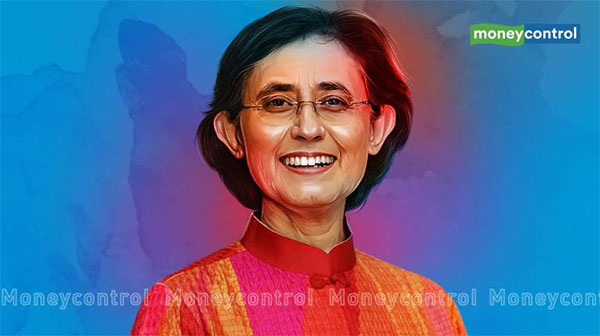'Not enough has changed when you look at diversity, including, but not restricted to, gender diversity. There is more talk than action there.'

Note to readers: How do corporate leaders surf life after hanging up their boots? What do they do next? What are the lessons they learned in their eventful journeys? What advice do they have for the current crop of leaders? Veterans Unpacked is a series of interviews aimed to offer readers lessons from retired bosses on life outside the corner office.
Best-known for her transformation of the biscuit company Britannia, Vinita Bali got her undergraduate degree in economics from the University of Delhi and a masters in management from the Jamnalal Bajaj Institute of Management Studies in Bombay (now Mumbai) before entering the corporate world.

The initiation for Bali, whose father worked for the ministry of defence, began with the Tata Group company Voltas, before she went on to join Cadbury Schweppes India. She then moved up the ranks at Coca Cola in foreign markets before coming back to India as the boss at Britannia, where she was instrumental in quadrupling the revenue to a little over a billion dollars in the span of a decade.
Bali, who now spends her time on boards that she is passionate about, lives in Bengaluru and is deeply focused on sustainability, nutrition, and the performing arts.
What have you been up to since hanging up your boots?
I don’t believe I hung up my boots – I am just exploring and walking new terrains. The analogy that comes to my mind is that in a full-time operational role, which is what I did for 35 years till 2014, you look at the world through a zoom lens, and what I do now is look at the world through a wide-angle lens. I must also add that I have appreciated the value of mastering the zoom lens, which is so critical for the next innings, or, to come back to the metaphor of boots, I have acquired several new pairs.
What keeps you busy now?
It is a combination of corporate and other boards – both in India and overseas, selective advisories and pro bono work for NGOs working in nutrition and art foundations. It is a portfolio that reflects my areas of competence, interest and conviction, and it is rather eclectic – covering the spectrum of business, academics, food and nutrition and the performing arts.
I have had the opportunity to work globally with some of the best minds on boards such as Syngenta, Smith & Nephew, Bunge, and GAIN (Global Alliance for Improved Nutrition), which I also had the privilege to chair. Presently, I am on the global boards of Cognizant and SATS Limited, and in India, the corporate boards are Crisil and Syngene International. I am also a member of the board of governors of IIM Bangalore and chair the CII National Committee for Nutrition, apart from active involvement in several performing arts organizations.
On the personal front, I exercise and practise stretching and walking and reading. I also listen to a lot of music and jazz, and enjoy Aretha Franklin. I love opera as well. My all-time favourite is Maria Callas.
Looking back, can you tell us three interesting events or anything that has stayed with you since?
There are so many that I have been fortunate enough to experience, starting with meeting Prime Minister Nehru in December 1962 (I was 7) when our school had collected money for the PM Fund after the war with China. Our school was invited to Teen Murti as part of the routine at that time when the PM met with people and I was chosen by the school to hand over the cheque to him. He spoke with us as though he had all the time in the world for this group of children ranging from 5 to 14 years – and the lasting memory of what he said was something like “remember you can become whatever you choose to be”.
The second was my meeting with Nelson Mandela, before the elections in April 1994, when I worked with Cadbury in South Africa (I was in South Africa in 1993 and 1994 – two of the most profound years in the history of the country). It was at a function with several other people, and in the middle of that crowd, I found a few minutes with him – just the two of us. He was intrigued about how I landed up in South Africa on my own and interested in hearing what I had to say. I mustered enough courage to ask him what was the one fear he had in the 27 years he spent imprisoned on Robben Island (and two other prisons)? I will never forget his response, which was to the effect of “having the courage to forgive”, when he was eventually freed.
The third was when Britannia’s work in nutrition was featured as one of the best three from around the world (there were close to 1,700 commitments and their performance), at the closing plenary session of the Clinton Global Initiative in New York in September 2009, in the presence of several philanthropists, political, business and development sector leaders from around the world. It was memorable because it was the only time that an Indian homegrown brand had been given such recognition in front of a global audience.
What do you miss most about the C-Suite?
Nothing, actually. Even though I entered the C-Suite very young, I was never attached to any of its privileges or trappings, including travel on Coke’s private jets. I’m a very much a person who lives in the present. I am still in touch with the many people I worked with from around the world and the countries I lived in – like the UK, Nigeria, South Africa, USA and Chile. For me, the C-Suite was about people and shared experiences.
If you had to relive your corporate career, what would you do differently?
If I had to do it again… I would look at inorganic growth far more seriously than I did. My mind set has largely been to accelerate organic growth through excellence in execution, innovation. But inorganic growth requires a different mindset, and risk-taking ability. I would also put sustainability and the search for profitable and environmentally sustainable business models front and centre of everything. Finally, we have at least started talking about ESG and recognizing the criticality of doing business in a manner that respects the concerns of the environment, social inequities and good governance (ESG), anchored by integrity and ethics.
What are the changes in the corporate world that you see now that are vastly different from your time?
Competitive intensity has increased in most domains, information technology and digitization have a huge role to play in how work gets done, and younger employees come with different expectations and attitudes. And therefore, the ability to make sense and sift out insights from noise will become an increasingly valuable skill. Other changes have also come gradually – like the composition of total compensation which includes share ownership, whether through ESOPs (employee stock ownership plans) or RSUs (restricted stock units); also the availability of capital for entrepreneurial ventures and unicorn businesses. On the other hand, not enough has changed when you look at diversity, including, but not restricted to, gender diversity. There is more talk than action there.
Which business leader in the current crop impresses you?
There are several who are navigating complexity and ambiguity in this very challenging current environment that has been with us for over a year now and delivering consistently, and it is really hard to choose any one. If I had to name one, it would be Azim Premji, and for his overall generosity and commitment to education.
How did you plan for life after retirement?
Retirement in the conventional sense has never been part of my mindset or mental model – I am just doing different work, having moved from a full-time operational role, to many full-time roles. I am also enjoying the opportunity to be a perennial student and learn about new domains and businesses. In many ways, boards - if chosen well - serve the purpose of a lifelong learning and development plan, at least for me. I have never been a person who postponed things for after retirement, because I can’t think in those terms. I kept my interest in reading and travelling and sports and theatre and other performing arts, right from the time I was in school to now.
Is there anything you would tell your younger self?
Yes, to be patient, listen better and understand the text, subtext and context.
What is your advice for the next cadre of corporate leaders?
I am not sure if I would call this advice – but the perspective I could offer is to take work seriously and responsibly, but not put it at the centre of your life. For, it is not about how our life fits into our work, but about how our work fits into our life.
I also invite them to think about leadership, which is a pattern of behaviour, as different from being a leader which is sometimes confused with position, title, and hierarchy in an organization. However, leadership is about what I do and how I do it, not what I say. It is about taking ownership for results, it is about accountability, about envisioning the future and ensuring the building blocks are in place to achieve it. Above all else, leadership is about character and work ethic. Skills and competencies are fungible and can be acquired, trained or outsourced – character is who we are and what defines us and guides our behaviour.
The last and final thought is to do what you truly enjoy and be curious about life. As Gandhi ji said, “Live as if you were to die tomorrow. Learn as if you were to live forever.”